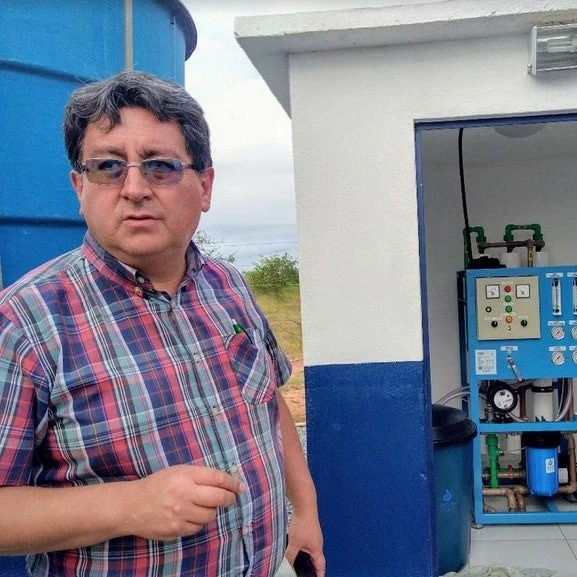 sanitation in Bolivia
sanitation in Bolivia
Located east of the Andes mountains in the tropical lowlands of Bolivia, the sprawling city of Santa Cruz is one of the fastest growing metropolitan areas in the Latin American region. The city is home to two million people -- one-fifth of Bolivia’s population. But despite being the country’s wealthiest city and commercial hub, a large proportion of Santa Cruz’s households still suffer from poor access to sanitation, notably in its peri-urban areas. Rapid population growth has outpaced the efforts of the national government, municipalities, and water utilities to provide sanitation through piped sewerage networks. The lack of adequate infrastructure is creating multiple challenges, including health hazards due to overflowing septic tanks, and environmental risks, such as the contamination of groundwater aquifers.
According to the 2017 data of the national regulator of water and sanitation (AAPS), only 49% of households are connected to the sewerage system, with the remainder of the city -- over 182,000 households -- being serviced by septic tanks, and to a lesser extent, latrines. And while health indicators related to water and sanitation provision have improved, Bolivia is still lagging behind in comparison to other countries in the region.
As part of the World Bank’s goal to help Bolivia strengthen the delivery of sustainable water and sanitation services for the most disadvantaged, a three-year pilot project on fecal sludge management in peri-urban areas of Santa Cruz was implemented in 2016, with funding provided by the Global Water Security and Sanitation Partnership (GWSP). The Vice-Ministry of Drinking Water and Basic Sanitation (VAPSB) and the regulatory body, the Authority for Supervision and Social Control of Drinking Water and Basic Sanitation (AAPS), worked together on the project, with support from the World Bank and the German Agency for International Cooperation (GIZ). The pilot focused on improving conditions of decentralized sanitation, informing the development of Bolivia’s National Strategy for Wastewater Management and Reuse, and generating models for improved and safe operation and maintenance of decentralized services.
The pilot intended to improve the way fecal sludge is collected, transported, treated, and disposed in Santa Cruz city. Key issues to improve fecal sludge management were examined, including institutional, regulatory, financial, environmental and social. This was done from the perspective of the municipal government and utilities, the informal and formal private entrepreneurs who work in collecting and transporting fecal sludge, and the households themselves. The pilot helped the municipal government develop protocols that improve the containment of fecal sludge through improvements to the maintenance of septic tanks and a certification program for septic tank construction. The initiative also worked on the development of operating procedures and training of the private entrepreneurs and their workers. And the procedures for issuing operational and environmental licenses to the service providers were reviewed to identify ways for improvement.
The implementation arrangements were based on the specific roles and responsibilities each institutional actor has in the sectors of water and sanitation, urban development, and environment. Without the acknowledgement of shared responsibilities from all parties, any initiative to improve the management of decentralized services couldn’t be successful. Participant institutions included the VAPSB, AAPS, the Regional Government (GAD) and the Municipal Government (GAM) of Santa Cruz, water utilities, such as SAGUAPAC and COOPAGUAS, and private entrepreneurs. These contributors actively participated in the design and implementation of the project through a technical coordination committee.
Equally important, households needed to be involved throughout every step of the project. Therefore, community awareness campaigns and engagement at the grassroots level were promoted and implemented to encourage participation and “buy-in.” A branding manual and a logo were developed. Publications, radio programs and media, such as Facebook, were used to disseminate the work and results of the project. Cartoon figures were created to represent feces and illustrate what happens when waste is not properly disposed. These figures were named “Fecalito,” “Super Manguerita,” and “Charco.” This approach yielded impressive results on children and families of the target areas.
As the pilot started yielding promising results, other municipalities in the metropolitan Santa Cruz area, including s Cotoca, La Guardia and Montero, showed an interest in joining the project. However, it quickly became apparent that tackling the problem in these areas would require a diverse set of solutions uniquely adapted to their urban environments. And because there is no single, simple solution to the urban sanitation problem, a promising way to achieve this undertaking was through citywide inclusive sanitation planning. Comprehensive approaches for both centralized and decentralized systems, solutions for the cities’ onsite and sewerage systems, and institutional issues have been under discussion and development since 2018 in these intermediate cities.
A thriving urban economy is not possible without safe sanitation. And the Sustainable Development Goals provide new impetus for ensuring access to sanitation services to help keep cities safer, and to ensure citizens’ health and well-being. By providing evidence-based technical assistance and working in partnership with national and sub-national government authorities, water utilities, the private sector and other bilateral cooperation agencies, the pilot is widely acknowledged to have contributed to the strengthening of the institutional environment and capacity for inclusive service delivery in the largest metropolitan area of Bolivia.


Join the Conversation